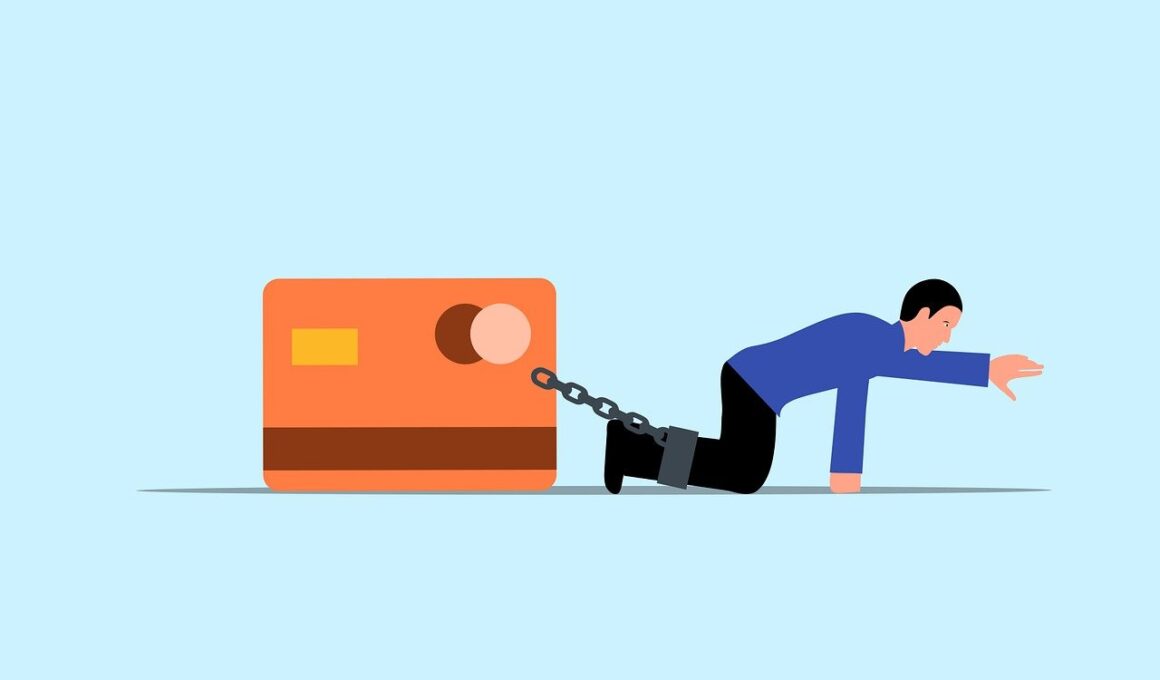How to Avoid Credit Card Debt Traps and Hidden Fees
Managing credit card debt can often become an overwhelming challenge, particularly when consumers fall prey to hidden fees and traps. To avoid these, start by understanding the terms and conditions of your credit card. Read the fine print to know about interest rates, fees, and any changes that can happen over time. Maintain a habit of making full payments on or before the due date to avoid unnecessary fees. It is also essential to keep your credit utilization ratio low, ideally below 30%. This means not using too much of your available credit. Additionally, setting up alerts can help remind you of payment dates and prevent late fees. It’s beneficial to keep track of your spending habits by regularly reviewing your statements. Recognize trends and identify areas where you could cut back. Another proactive strategy is to negotiate with your credit card issuer for lower interest rates or fees, as many are willing to do so in order to keep you as a customer. Doing so may help in significantly reducing your debt over time.
Understanding Interest Rates
Interest rates can significantly impact how much you pay over time, leading to unintended accumulation of credit card debt. Understanding how these rates work is crucial to avoiding debt traps. Credit cards typically come with an Annual Percentage Rate (APR), which determines how much interest you’ll accrue. Some credit cards offer introductory rates that are lower but increase significantly after a set period. Be wary of promotional offers, as these often come with hidden clauses. Always check how your interest is calculated, whether it’s daily or monthly, as this can affect your total due. Additionally, consider the compounding nature of interest, which means that unpaid interest can lead to increased debt when it combines with your principal. Carefully compare different credit card offers to find the ones with the best rates. If you already have a high-interest card, it may be wise to inquire about balance transfer options to cards with lower rates. However, ensure that the transfer fee doesn’t outweigh your potential savings. Educate yourself about interest rates to manage and reduce credit card debt more effectively.
Knowing how hidden fees can sneak up on you is essential for avoiding credit card debt traps. Many credit cards have fees that can quickly accumulate, such as annual fees, late payment fees, and over-limit fees. Moreover, foreign transaction fees can also become a surprise for travelers. Always read through the fee structure provided by your card issuer at the outset. It’s important to be aware of all applicable charges in order to avoid pitfalls down the line. Another useful approach is to look for credit cards that offer no annual fee or have rewards that make the fee worthwhile. Budgeting is a powerful tool against accruing hidden fees. Maintain a financial forecast that accounts for possible expenses related to your credit card usage. If you travel often, use cards without foreign transaction fees. Remain vigilant about your spending and ensure that your habits align with your financial goals. This proactive approach can help you save money while simultaneously reducing the likelihood of unnecessary fees and charges that contribute to credit card debt.
Building a Budget to Tackle Debt
Building a precise budget is a vital step towards managing credit card debt effectively. Determine your monthly income and track all expenses to visualize where your money goes. Separate your expenditures into fixed costs like rent and variable costs such as groceries. Highlight areas to cut back, thereby allocating additional resources towards your credit card payments. Establish a specific amount to put towards your credit card debt monthly, which will help you form a disciplined approach to repayment. Utilize various budgeting tools or apps that allow you to track spending and set reminders for payments. Include savings in your budget for emergencies, which can help you avoid relying on credit cards when unexpected expenses arise. Regularly revisiting your budget is crucial; that way, you can adjust it as income, expenses, or financial goals change. Also, set short-term and long-term financial goals, such as paying off one card at a time. A strategic budget doesn’t just reduce debt; it paves the way towards greater financial stability and freedom from the burdens of credit card debt.
Another crucial tactic for avoiding credit card debt traps involves prioritizing high-interest credit cards. By focusing your efforts on these debts first, you can minimize the overall interest paid over time. This process is known as the avalanche method. List out all your credit cards, including their balances and interest rates. Once you have this information, allocate any extra funds toward the card with the highest interest rate, while making minimum payments on others. As that card gets paid off, roll the funds into the next highest interest card, creating momentum in your repayment process. Alternatively, consider the snowball method, where you focus on paying off smaller balances first to gain psychological momentum. Whichever method you choose, consistency and commitment are key. Track your progress and celebrate small victories as you pay off debts. Additionally, avoid incurring new debt during this period. Being disciplined and mindful of your spending will aid in achieving your credit card goals faster, ultimately paving the way to a debt-free future.
Educating Yourself About Credit
To successfully avoid credit card debt traps, it’s fundamental to educate yourself about credit management. Knowledge is a powerful ally when it comes to handling finances responsibly. Familiarize yourself with various financial terms, interest calculations, and how credit scores work. A good credit score can open doors to better financing options and lower interest rates. Online resources, books, and financial workshops can offer a wealth of information on managing credit effectively. Consider consulting a credit counseling service for professional insights. These services can aid in budgeting, securing better credit terms, and even negotiating with creditors. Moreover, learning how to dispute errors on your credit report can dramatically affect your financial status. Monitor your credit report regularly to catch inaccuracies that could negatively impact your score. Staying informed allows you to make better financial choices, which ultimately leads to less reliance on credit cards and lower financial stress. Empower yourself with knowledge, and take control of your credit situation to effectively navigate the complexities of credit and debt management.
Ultimately, maintaining open communication with creditors can prove invaluable in avoiding credit card debt traps. If you find yourself facing challenges in making payments, reach out to your credit card provider proactively. Many issuers are willing to offer assistance or even alternative payment plans when they recognize a responsible customer making the effort to communicate. It’s also beneficial to understand your rights as a consumer regarding debt collection practices. Keeping abreast of your financial obligations will enhance your ability to negotiate better terms. Some card issuers might offer hardship programs that can lower your interest temporarily or reduce monthly payments. It’s always best to be candid about your financial state. By maintaining an open dialogue, you not only create a supportive environment but also establish a plan that works for you. Make sure to document any agreements made to protect yourself. By engaging with creditors transparently, you take substantial steps toward ensuring financial health while lowering the risk of falling into the traps associated with credit card debt.





